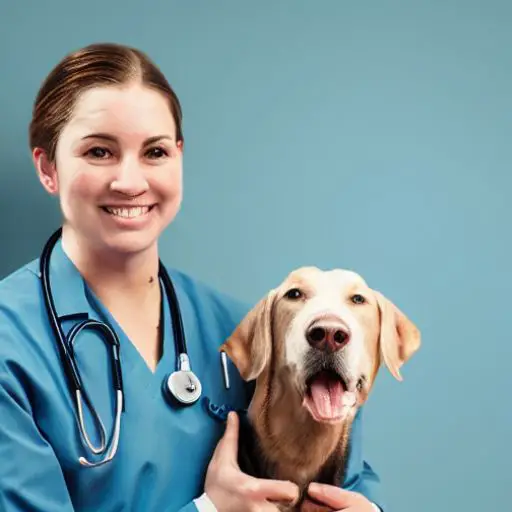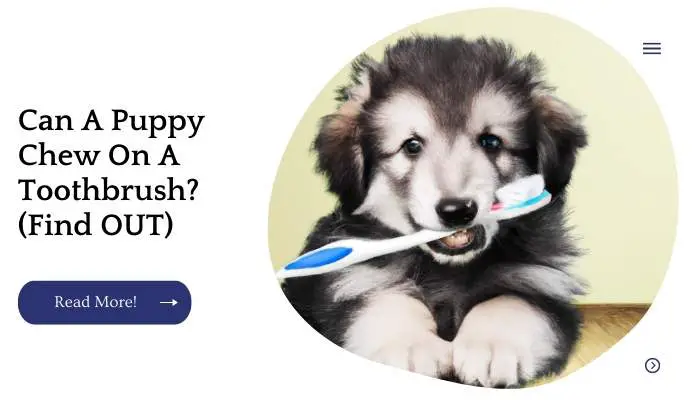Brushing my dog’s teeth was something that took a little bit of time and effort. However, it’s now become part of our daily routine, and I couldn’t imagine not doing it!
It’s always best to start grooming your puppy as soon as possible so that they grow up accustomed to the process.
If you’ve recently adopted a new dog or just acquired one from a shelter then this article will help answer some of your questions about brushing their teeth and why it is so important for them.
| Takeaways |
|---|
| Puppies may chew on toothbrushes during their teething phase. |
| Supervision is necessary to ensure the puppy’s safety while chewing on toothbrushes. |
| Providing appropriate chew toys can redirect the puppy’s chewing behavior. |
| Chewing on toothbrushes can be potentially harmful, leading to choking or ingestion of bristles. |
| It is recommended to use designated dog chew toys and dental hygiene products. |
Can A Puppy Chew On A Toothbrush?
Yes, your puppy can chew on toothbrushes. A toothbrush is made of a material that is safe for chewing, and it can be used as a way to clean teeth.
A toothbrush can also be used by some dogs as a chew toy that helps pass the time while you’re brushing them or giving them baths.
If you’re wondering how long your puppy will chew on things, our article on how long puppies chew provides valuable insights into this common behavior. Understanding the duration of chewing can help you manage your puppy’s teething phase. Check it out for more information and helpful tips on puppy chewing behavior.
Is There Any Danger In Letting A Puppy Chew On A Toothbrush?
There really is no danger in letting your puppy chew on a toothbrush. Your dog’s teeth will be fine and so will the toothbrush!
However, if your dog bites down too hard on the end of the toothbrush or pushes too hard against their gums while chewing it could cause damage to both them and to your toothbrush.
You should also be aware that certain dogs may get bored with this activity very quickly, so make sure to keep an eye on how much time they spend chewing the brush before taking it away from them.
| Risks |
|---|
| Choking hazard |
| Ingestion of bristles |
| Damage to the toothbrush |
| Intestinal blockage |
| Oral injury or irritation |
What Should I Do If My Puppy Chews On My Toothbrush?
If you’re concerned that your puppy might be chewing on the toothbrush, it’s important to remember that they are not old enough to brush their own teeth yet.
You should be doing the brushing for them until they are mature enough to do it themselves.
The toothbrush is also not meant to be chewed on by puppies.
Some dogs do enjoy chewing on things that aren’t toys and may attempt to chew on this too; however, if the dog swallows any pieces of the toothbrush then there is a risk of injury or choking in severe cases.
Are you struggling to control your puppy’s chewing habits? Our easy guide on tying out a puppy offers effective techniques to manage their behavior. Learn how to keep your puppy safe and prevent unwanted chewing incidents by checking out our article on tying out a puppy.
How Long Can I Keep The Toothbrush Out For My Puppy To Chew?
The answer to this question depends on two things: how long your puppy chews on the toothbrush, and whether or not you’re using a new or used one. If your puppy chews on the toothbrush for longer than a day, replace it with a new one.
This way you can be sure that all of the bacteria has been removed from the bristles of your old brush (which could have been transferred to your puppy).
If your puppy chews on the toothbrush for less than a day, keep using it until it becomes unusable (usually after about 3-4 days).
When Should I Replace My Toothbrush?
The best time to replace your toothbrush is after three months of use. If you have been sick or are experiencing a cold, it’s also wise to change out your brush sooner than that.
You want to avoid using the same toothbrush if it has been dropped on the ground because doing so could lead to bacterial contamination.
| Indicator | Replacement Frequency |
|---|---|
| Bristles frayed or worn | Every 3 months |
| Illness or infection | Immediately |
| After recovering from illness | Immediately |
| Excessive wear or damage | As needed |
| Dentist recommendation | Follow dentist’s advice |
Does It Matter Which Brand Of Toothbrush I Purchase For My Puppy?
The answer to this question is: it depends. The brand and type of toothbrush you choose should depend on three main things:
- the size of your dog’s mouth
- the breed of your dog
- the age of your dog.
Curious about when your puppy will get all their teeth? Discover the timeline of puppy dental development in our informative article. From milk teeth to permanent ones, our guide on puppy tooth development provides insights into this important milestone. Explore more about puppies’ dental journey by visiting how long it takes for puppies to get all their teeth.
Should I Use Dog Toothpaste With My Puppy?
Yes, you can use dog toothpaste with your puppy. It is safe for them to use and can improve the health of their teeth and gums.
As an alternative to human toothpaste, it helps clean their mouths and prevent bad breath, making it a great treat for your pet.
It’s important to know that not all brands of dog toothpaste are safe for puppies so it’s important to find one that does not contain fluoride or sodium lauryl sulfate (SLS).
How Many Times Should I Brush My Puppy’s Teeth Per Day?
You should brush your puppy’s teeth once a day, and twice if he is a heavy chewer. If he is a light chewer, you can brush them just once in a while. It’s best to brush the teeth after each meal, so that way you can get rid of food particles that may be stuck to the teeth or gums.
| Puppy Age | Recommended Brushing Frequency |
|---|---|
| 8-12 weeks | 1-2 times per day |
| 3-6 months | 1-2 times per day |
| 6-12 months | 1-2 times per day |
| Adult | 2-3 times per week |
Will A Dog Be Able To Tell Me When His Teeth Need Brushing Or Polishing?
Dogs can’t tell us when they’re in pain from an infected tooth or an abscess. They also aren’t able to tell us when their teeth are hurting.
Dogs are unable to use a toothbrush and dog saliva is acidic, so it doesn’t help clean the teeth either. If you still want your dog to have healthy gums though, there are other options for giving them oral care besides just brushing their teeth.
When can you safely bathe a newborn puppy? Our article on bathing a newborn puppy explains the appropriate timing and precautions for keeping your little one clean. Ensure their well-being and hygiene by following our expert advice. Learn more about caring for newborn puppies by visiting how soon you can bathe a newborn puppy.
Why Should You Brush Your Puppy’s Teeth?
- Bad breath
- Tooth decay
- Gum disease
- Infection
What Are The Benefits Of Brushing Your Pet’s Teeth Regularly?
Brushing your pet’s teeth can help prevent tooth decay, periodontal disease and bad breath. The act of brushing also helps to increase the life of their teeth and prevent gum disease.
For many people, it is easier to brush their own teeth than it is to brush those of their pet. If you are one of these people then this article will be especially helpful for you!
Feeding your puppy the right amount is crucial for their growth. Discover the ideal food intake for a puppy American Bully in our comprehensive article. Our guide provides veterinary insights and feeding recommendations to ensure your puppy’s nutritional needs are met. Find out more about feeding an American Bully puppy by checking out how much a puppy American Bully should eat.
Conclusion
We hope that you now have a better understanding of the importance of caring for your puppy’s teeth.
As we said earlier, it is never too early or too late to start this process. With regular brushing and maintenance, your pet’s mouth will remain healthy and strong throughout its lifetime!
Further Reading
Here are some additional resources for further reading on the topic:
Can Dogs Chew on Toothbrushes?: This article explores the safety and potential benefits of allowing dogs to chew on toothbrushes, providing insights into dental hygiene for dogs.
Dangerous Items Dogs Chew: Learn about the potential dangers of items that dogs may chew on. This blog post highlights common household objects that can pose risks to your furry friend.
Brushing Teeth in Dogs: This resource offers guidance on brushing your dog’s teeth, including techniques, recommended products, and tips for establishing a dental care routine.
FAQs
Here are some frequently asked questions related to the topic:
Can puppies chew on toothbrushes?
Puppies may chew on toothbrushes as they explore the world and go through their teething phase. However, it’s important to supervise them and provide appropriate chew toys to avoid any potential harm.
What are the risks of dogs chewing on toothbrushes?
Chewing on toothbrushes can lead to bristle ingestion or damage to the toothbrush, which may pose a choking hazard or cause intestinal blockage. It’s best to use designated dog chew toys and dental hygiene products.
How can I train my puppy to chew on appropriate items?
To train your puppy to chew on appropriate items, provide a variety of safe chew toys and reward them when they choose those toys. Consistency, positive reinforcement, and redirection techniques can help discourage inappropriate chewing behaviors.
Are there alternatives to toothbrushes for dogs’ dental care?
Yes, there are alternatives to toothbrushes for dogs’ dental care. Dental chews, dental wipes, and specially designed dental toys can be effective in promoting oral hygiene and reducing plaque and tartar buildup.
How often should I brush my dog’s teeth?
Ideally, you should aim to brush your dog’s teeth daily or at least several times a week. Regular brushing helps maintain oral health, prevents dental issues, and keeps your dog’s breath fresh.

I’m Dr. Hellen James, a professional veterinarian with a deep interest in the ways that litter size affects the health of animals. I’ve spent years studying this subject and performing research on reproduction in many different kinds of creatures.


